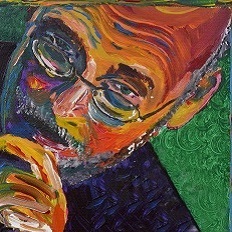Have scope—will travel
You never know what will get a patient to open up.
The following is a mostly true story, with some minor details changed to protect the patient's identity.
I was on the geriatric consult service at Saint Marys Hospital in scenic Rochester, Minnesota. The majority of our consults were for patients post-trauma with conditions like delirium, frailty, and polypharmacy, with a helping of goals-of-care discussions.

One Tuesday morning, a new consult popped up: hypoactive delirium on the rehabilitation service. It was a long walk but I got my steps in that way.
Mr. J had been hospitalized for several months with a variety of complex medical issues involving his heart, lungs, kidneys, and immune system. He had been noted to have a somewhat depressed affect on transfer to rehab. Over the last week he had stopped talking and would not eat. He was started on an antidepressant. A head CT had shown no acute findings, and his labs were normal. The team worried about cognitive impairment mixed with depression.
I had uncharacteristically reviewed his chart in advance, including his social and family history. He was a retired horse breeder with no family.
When my team entered the room he was lying in his bed and did not respond to our greeting. Supine and stone-faced. Was it Parkinson's?
I went to turn off the TV, which was playing an old episode of “Bonanza.” When I went to hit the off button, I thought I saw a small response. My team is very used to me going off on odd tangents. When this one started, I could see their eyes roll and their phone thumbs begin to twitch. But they were going to learn an unexpected lesson.
I commented that I had never been a huge “Bonanza” aficionado, but I loved some other shows of the same era. I asked him if he remembered “Have Gun—Will Travel.” He suddenly turned his head and, to everyone's surprise, said “Have Gun—Will Travel.” I asked if he remembered the name of the hired gun on that show. He replied, “That was Paladin, played by Richard Boone.”
Everyone was shocked. Mr. J and I spent the next 20 minutes talking about these classic gems: Who was the best Cartwright? (Hoss of course.) Who was the star of “Branded”? (Clint Eastwood!) Before the visit ended, I sang the parody of the “Branded” theme song that I learned at camp when I was 10: “Stranded, stranded on a toilet bowl, what will you do when you're stranded, without a roll?”
We both cracked up laughing as my team stared in disbelief. This patient was anything but cognitively impaired. He was just sick of hospitals and of being ill and alone and had been “playing possum.” Every day until Mr. J was discharged, I would visit with him and talk old Westerns. It was the highlight of my day.
We spend so much time giving medicines, ordering tests, and making diagnoses, but sometimes it just takes a little horse sense to figure out what's wrong with your patient.



